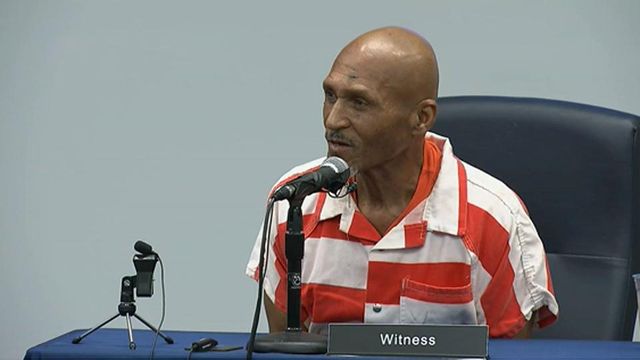Conviction for 1976 double murder to get judicial review after innocence inquiry
Joseph Sledge, a North Carolina prison inmate incarcerated for more than three decades for a double murder he says he didn't commit, will have the opportunity to go before a special three-judge panel to prove his innocence.
Posted — UpdatedAfter a jury failed to reach a unanimous verdict in his first trial in 1978, a second jury on Aug. 31 of that year found Sledge guilty of two counts of second-degree murder in the deaths.
At the time of the crimes, Sledge had been serving a four-year sentence at a prison work farm for larceny when he escaped a day before the slayings. That factored into his conviction, as well as key testimony from two fellow prisoners who said Sledge admitted to the killings.
One of the inmates who testified against Sledge recanted his testimony last year, saying prison officials "fed" him details about the crime in exchange for leniency for a drug violation. The other inmate died in 1991.
Recent DNA testing on hairs found at the crime scene also shows that the hairs could not have been Sledge's. Testing in the 1970s could only determine that they were from a black male. The victims were white.
He told the commission that a deputy told him the killings were being pinned on him because "the trail is getting cold and they can't catch the guy who did it."
"He gave me enough information to give me a warning to let me know what was going to happen," Sledge said of the conversation, which he recalled as being sometime in 1977. "I figured they were going to be honest about it. I figured they were going to go on and try me and acquit me."
Bladen DA: 'Substantial questions exist'
Bladen County District Attorney Jon David, who was not district attorney in the 1970s, praised the Innocence Commission’s work. After attending the three-day hearing, he said, he is "deeply committed to doing the right thing" and wants to move with "deliberate speed."
"Based on what I heard, I believe a substantial question exists that calls into question the sanctity of the evidence that was used to convict Mr. Sledge," David said. "I think the commissioners got it right – based on what I heard – and that it's important that we take this new information and we carefully consider it as we move forward together in our aim to seek the truth in this matter and to achieve justice in this case."
David declined to comment on how the Davis family – who also attended the hearing – is feeling. He also would not say if they are convinced of Sledge's guilt or open to the possibility that he is innocent.
The family spoke to the commission during a closed hearing and has asked that the media respect its privacy.
"The general feeling among them was one of unfamiliarity with the process. They're reliving a lot of the horror of what happened to their loved ones year ago, and I think, like me, they're committed to making sure that justice is achieved," David said. "I think they're a little confused about the process and they're unsure about what the road ahead looks like."
The eight-member Innocence Commission deliberated for more than two hours before reaching its decision, paving the way for North Carolina's chief justice to appoint within the next 30 days three judges to convene a special hearing on Sledge's case.
There is no timeframe on when that hearing should occur. It is treated similarly to criminal trials except there is no jury and Sledge and his attorneys have the burden of proof – meaning he would be considered guilty until proven innocent.
"I'm grateful that the process is moving forward, Sledge's attorney, Christine Mumma, said. "The evidence that was presented over the last three days, in my mind, just confirms what we've been saying for many years, and that is that Joseph Sledge is absolutely innocent of the murders of Josephine and Ailene Davis."
DNA evidence found after 11 years of searching
Despite affidavits and statements from law enforcement saying the evidence no longer existed, she said, Innocent Commission staff found the hairs and other evidence in "a matter of days."
One of those staff members testified about a quest to find as much as possible during an extensive search of basements, boiler rooms and offices in courthouses, prosecutors' offices and sheriff's offices in both Bladen County and Columbus County, where Sledge was prosecuted due to pre-trial publicity.
"I have no doubt in my mind that if the searches had been as adequate 10 years prior, we would have more of the evidence that is currently missing," Mumma said.
The lack of organization and controls in place to maintain the integrity and quality of evidence – for example, evidence in rape cases was being stored at wrong temperatures – raised concerns among commission staff, who offered to assist the Bladen County Sheriff's Office to adopt new standards in how it maintains evidence.
As recently as this week, the sheriff's office reported to the commission that, under the direction of a new sheriff, it is taking new steps to make how it handles evidence a priority. That includes a new, climate-controlled evidence room, where items will be organized and cataloged. The process will start next week and be completed sometime in January.
• Credits
Copyright 2024 by Capitol Broadcasting Company. All rights reserved. This material may not be published, broadcast, rewritten or redistributed.






